|
FAQs on Identification of Stinging-Celled
Animals
22
Related Articles: Cnidarians, Water Flow, How Much
is Enough,
Related FAQs: Cnidarian IDs 1, Cnidarian IDs 2, Cnidarian IDs 3, Cnidarians ID 4, Cnidarians ID 5, Cnidarians ID 6, Cnidarian ID 7, Cnidarian ID 8, Cnidarian ID 9, Cnidarian ID 10, Cnidarian ID 11, Cnidarian ID 12, Cnidarian ID 13, Cnidarian ID
14, Cnidarian ID
15, Cnidarian ID
16, Cnidarian ID 17, Cnidarian ID 18, Cnidarian ID 19, Cnidarian ID 20, Cnidarian ID 21, Cnidarian ID 23, Cnidarian ID 24, Cnidarian ID 25, Cnidarian ID 26, Cnidarian ID 27, Cnidarian ID 28,
Cnidarian ID 28,
Cnidarian
ID 29,
Cnidarian ID 30,
Cnidarian ID 31,
& Anemone ID 1, Aiptasia
ID 1, Stony Coral ID
1, Mushroom Identification,
Soft Coral ID, Alcyoniid ID, Xeniid ID,
|
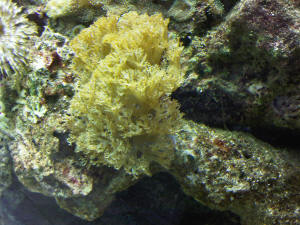
|
|
Coral ID 1/22/10
Good Day.
<Hello Derek>
I have gone to a few 'boards' with this ID question, but
I have yet to get a satisfactory answer. I hope you can help!
<Hopefully.>
I purchased a piece of Idaho Grape Cap (Tyree) from a fellow
reefer and he threw in this 'bonus' piece that he called
a 'unidentified softy" (pls. see attached pic). I cannot
for the life of me figure out what this is. It is on
a hard stalk, and the polyps come out like an encrusting
Gorgonian or GPS...but when retracted it has a purple/white
color.
Please help - I want to be sure of how to care for this little
guy.
<I think you are on the right track thinking it is an
encrusting Gorgonian and it appears to be a Briareum specie
encrusting a dead coral skeleton. I have a growth of this myself
and your coral is very much similar to mine. See attached photo I
took for comparison. Bob may have a more accurate description and
his input will show on the dailies. Bob, feel free to use my
photo if you would like.>
Thanks,
<You're welcome. James (Salty Dog)>
Derek L. Rush
|
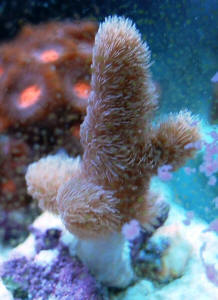 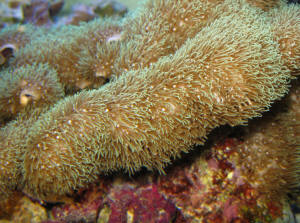 |
|
Re: Coral ID 1/22/10
Thanks so much. Not only are ya'll a great service to all
hobbyists but you're quick too!
<Yep, ya oughta see me run.:) James (Salty Dog)>
Derek
|
|
LR Hitchhiker ID -- 01/12/2010
Hello,
<Hello! JustinN here!>
I attached 2 pics of something I have growing on a live rock I
purchased.
<I see this>
I searched it and it looks like it could be a mushroom?
<Indeed -- does appear to be a Corallimorph of some sort --
see here:
http://www.wetwebmedia.com/corallim.htm>
Pretty cool. I was wondering if you knew what it was and if so is
my 18" 17 watt fluorescent light enough to support it?
<Mmm, not likely, no. This is evidenced by how elongated these
specimen are -- they are stretching for the (already inadequately
strength) light.>
I will eventually be getting a better light but this is in the
mean time.
Its a FOWLR tank 30 gal. Thanks.
<It should survive for some time with the lighting you have
now -- it is clearly not completely bleached -- but it will
likely never thrive under this lighting. They may survive longer
with some meaty food provided occasionally, such as frozen Mysis
shrimp. Good luck! -JustinN>
|
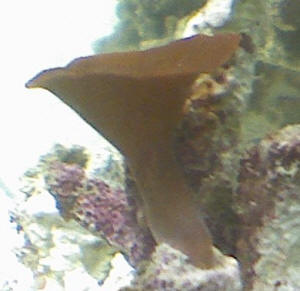 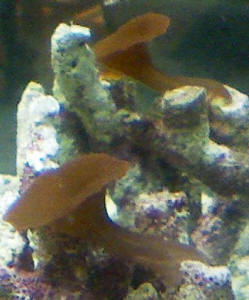 |
Need help identifying; Shrooms and
Aiptasia, Oh, Marco's go -- 01/12/10
Hello,
<Hi.>
I attached 2 pics of something I have growing on a live rock I
purchased. I searched it and it looks like it could be a
mushroom?
<Yes'¦ are Corallimorphs also known as mushrooms. And
in the first picture I also see some Aiptasia in the upper left
background. These should be removed. See
http://www.wetwebmedia.com/marine/inverts/cnidaria/anthozoa/aiptasia/aiptasia.htm
>
pretty cool. I was wondering if you knew what it was and if so is
my 18" 17 watt fluorescent light enough to support it?
<A little too dark in the long run. You can see the mushrooms
have quite long 'stems''¦ That's their way
to show you they'd appreciate more light.>
I will eventually be getting a better light but this is in the mean
time.
<For some weeks it should be sufficient. Also see
http://www.wetwebmedia.com/corallim.htm >
Its a FOWLR tank 30 gal. Thanks.
<Welcome. Marco.> |
re: need help identifying, & now SaraM!
01/12/10
yes their are 2 Aiptasia and 3 feather dusters.. I thought they
looked kind of cool but you say I should remove them?
<Not the feather dusters, just the Aiptasia. -Sara M.>
Need help identifying; Shrooms and Aiptasia --
01/13/10
Yes there are 2 Aiptasia and 3 Feather dusters.. I thought they
looked kinda cool, but you say I should remove them?
<Yes, it's likely they'll multiply and if they touch
your Corallimorphs, they'll sting them. Marco.>
|
|
Hitch-hiker anemone id -- 01/03/10
Hi Crew!
I've looked through a ton of info on your amazing site, but
I've not managed to find a concrete ID of this anemone
<Mmm, does this animal have a solid "base?"... A
corallite skeleton? It appears to... Not an Actinarian if so, but
likely a Scleractinian... a stony coral. >
that's hitch-hiked into my new tank a couple of weeks ago on
some live rock. The rock is apparently from Fiji.
The center of the anemone is predominantly black and white, and
the tentacles are a translucent red, with clubbed tips. It's
not moved since I first spotted in in there, apart from
repositioning itself slightly to face downwards. It doesn't
seem to like the light and to begin with would only come out when
the lights were off.
<Mmm, another clue/input that leads/points me to the
Stony...>
Now it stays just outside the face of the rock with the lights
on, then stretches out 0.25" or so and out to full size when
the lights are off. It's about 0.75" across with the
lights on, maybe 1" with the lights off. There are six
evenly spaced tentacles closest to the oral opening that stand
out more than the others, especially when it is fully
extended.
<Both groups are Hexacorallians... Discounts the likelihood of
being a soft coral or other Octocorallian>
It's been suggested that it may be a majano anemone, but it
doesn't seem to be quite like any pics of majanos that
I've managed to find. It seems to be doing well in the new
tank so far, after enduring the curing of the live rock and the
trip from Fiji-LFS-my tank.
<Testimony to the quality of the LR and your good care>
Can you folks help me pin down what this is, and perhaps advise
whether it's suitable to have in a tank with false percula
clownfish?
<I would keep it in any case... don't know if the Clown
will associate with it... likely will avoid if it is
unsuitable>
Thanks in advance for any help you can offer me, and thanks for
providing such a valuable resource!
All the best,
Dan.
<Thank you for sending this along Dan. Cheers, Bob
Fenner>
|
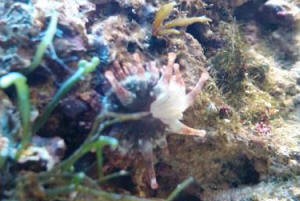 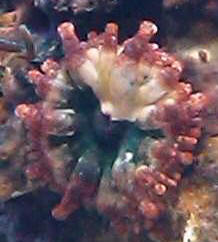 |
|
Re: Hitch-hiker anemone id 1/3/10
Hi Bob,
Cheers for taking a look at this for me, much appreciated!
That it may be a coral rather than an anemone is something I
hadn't even thought about..
The whole creature seems to be formed from soft tissue, as far
down the base as I can see anyway. When threatened it will kinda
clench, and when offered dried bloodworm (only thing I really had
around to attempt direct feeding with) it pulls it quickly
towards the oral opening and then completely retracts into the
rock out of view.
I did mean to mention this in my first mail, but somehow missed
it.
Once again, thanks for your time looking at this!
Cheers,
Dan.
<Time will tell Dan... which Cnidarian group this animal
"belongs to"... My bet/guess is currently on a
Stony/Scleractinian. Cheers, BobF>
Re: Hitch-hiker anemone id
Ahhh... Just looked at some LPS corals and some of them look
exactly like it! Thank god for your help or I would probably be
bumbling along in completely the wrong direction for weeks to
come!
Now to try and track down the best way to try and care for
it..
Thanks a million Bob, a thousand respects!
Cheers,
Dan.
<Thank you Dan. BobF>
|
|
Tricky ID question -- 12/14/09
Hi Crew,
I've been trying to get a ID on this little hitchhiker little
over a week now without any success so I'm turning to you as
my last chance. Instead of mailing photos I'm just linking
them from a local forum where I tried to get an ID first.
http://www.saltvattensguiden.se/forumet/attachment.php?attachmentid=40687&d=1260203100
http://www.saltvattensguiden.se/forumet/attachment.php?attachmentid=40852&d=1260636838
The story is that after moving a piece of rock slightly I found
these 2 polyps and my first thought was that I had found 2 Majano
anemones
<Mmm, no>
but as I have never had Majano before I asked about them in a
forum before removing them and some of the other members thought
I should leave them for now as they didn't think they looked
like Majano.
<Good>
I decided to leave them and turn the stone around so I could see
them every time I went past the aquarium. When I turned the stone
around I saw that they wasn't attached to stone but rather
growing as a part of the stone.
<Yes. In both pics you can see a skeleton from what is likely
another specimen>
In the second picture you can see remains of a dead polyp that I
think is of the same type as the two living (I base that on
studying the base of the polyp at night when it's retracted
and comparing it to the base of the dead polyps).
<Yes>
Below the polyps in the second picture is another 5 remains of
dead polyps that tells me it seems to grow in a branching
way.
<Mmm, maybe. I suspect this is a solitary polyp
species>
I don't think it's an anemone anymore and I'm
guessing at some kind of LPS but I really have no clue so I'm
looking for all help I can get on identifying this so I can give
it the best possible place in my tank or if it's bad remove
it before it gets bigger.
Thanks in advance & best regards,
Tony
<There are a few Scleractinian (stony coral) families that
this might be.
See the Net, WWM re: Perhaps peruse here:
http://wetwebmedia.com/dendroidfaqs.htm
see the pix about midway down... and the families Rhizangiidae,
Oculinidae.
Bob Fenner>
|
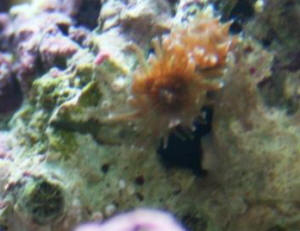 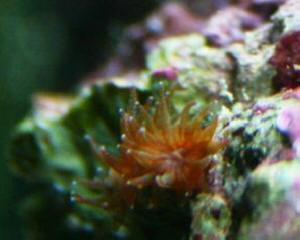 |
|
SV: Tricky ID question, Cnid., Scler.
f's -- 12/14/09
Thanks for the link, the pictures half way down does look a bit
like the once I have, mine is just much more brown. I have also
found some pictures of Galaxea that looks a bit like the one I
have but I think I'll have to wait with a better ID untill it
grows bigger/gets more polyps.
<Mmm, color can/does change with local conditions, mainly
light factors and foods... The physical aspects of corallites is
most useful for identification>
This far I have a feeling it's a "day-active" coral
filled with zooxanthellae as it completely deflates within 60
minutes after lights go out and it only starts inflating again
when I turn lights on in the morning.
<This behavior/activity is also variable with the same
"color" determinants as mentioned above>
I'll post again if I notice anything worth documenting :)
/Tony
<Thank you, BobF>
|
|
Re: Orange rock beauty, now... Anem. id?
11/05/09
Bob, thanks for your quick reply I was also wondering if you
could help me identify this "anemone" here they call it
anemona de terciopelo (velvet anemone) and is also from the
Caribbean I'm also sending a picture for you to enjoy of my
"baby" a foot long panther grouper chilling next to my
pair of clown fish (no incident to regret yet and is been a time
).
<Yikes... am very surprised this bass hasn't gulped the
Clowns down>
Saludos desde panama
<And this Anemone... is bizarre! I've never seen anything
like it in the tropical West Atlantic... Would you please send a
larger, more-resolved image along so I can in turn share it
about? This may be a soft coral (I don't think it is an
Actinarian), or even a Hydrozoan of some sort. Very new to me.
Gracias usted. Bob Fenner>
|
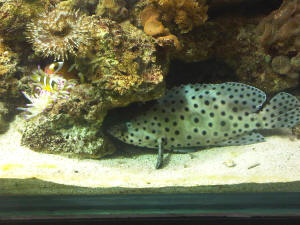  |
|
|

